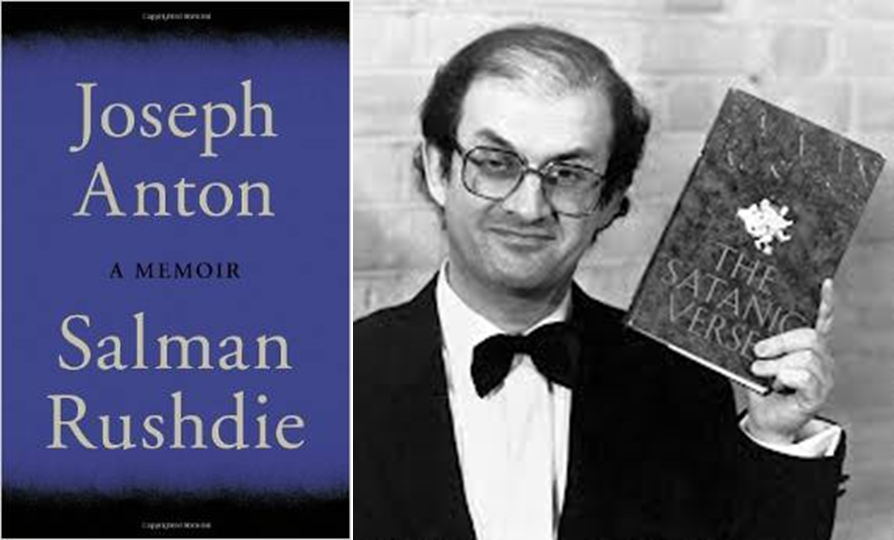Friday, August 22, 2014
Book Review: Joseph Anton by Salman Rushdie
Monday, August 18, 2014
Book Review: Chikaveera Rajendra (A Kannda Novel)
 ಕೊಡುಗು ರಾಜ್ಯ
ಬ್ರಿಟಿಷರ ಕೈ ಪಾಲಾಗುವ ಮುಂಚೆ ಆಳುತ್ತಿದ್ದ ಅರಸು ಚಿಕವೀರ ರಾಜೇಂದ್ರ. ಆ ಕಾಲಘಟ್ಟದ ರಾಜಕೀಯ ಸನ್ನಿವೇಶಗಳು
ಹಾಗೆಯೆ ಕೊಡಗು ಸಮಾಜದ ರೀತಿ ರಿವಾಜುಗಳ ಸ್ಥೂಲ ಪರಿಚಯ ಈ ಪುಸ್ತಕದ ವಿಷಯ ವಸ್ತು.
ಕೊಡುಗು ರಾಜ್ಯ
ಬ್ರಿಟಿಷರ ಕೈ ಪಾಲಾಗುವ ಮುಂಚೆ ಆಳುತ್ತಿದ್ದ ಅರಸು ಚಿಕವೀರ ರಾಜೇಂದ್ರ. ಆ ಕಾಲಘಟ್ಟದ ರಾಜಕೀಯ ಸನ್ನಿವೇಶಗಳು
ಹಾಗೆಯೆ ಕೊಡಗು ಸಮಾಜದ ರೀತಿ ರಿವಾಜುಗಳ ಸ್ಥೂಲ ಪರಿಚಯ ಈ ಪುಸ್ತಕದ ವಿಷಯ ವಸ್ತು.
ಅತಿ ಮುದ್ದಿನಿಂದ ಹಾಳಾಗಿ ಬೆಳೆದ ರಾಜಕುಮಾರ ಚಿಕವೀರ ರಾಜೇಂದ್ರ. ಬಾಲ್ಯದಲ್ಲಿ ಅವನಿಗೆ ಅವನದೇ ವಯಸ್ಸಿನವನಾದ ಕುಂಟ ಬಸವನೊಂದಿಗೆ ಮಾತ್ರ ಸಲಿಗೆಯ ಗೆಳೆತನ. ಮುಂದೆ ರಾಜನಾದ ಮೇಲೂ ಅವನನ್ನೇ ಮಂತ್ರಿಯಾಗಿಸಿಕೊಳ್ಳುತ್ತಾನೆ. ಆದರೆ ಅವನ ಕೆಲಸವೇನಿದ್ದರೂ ರಾಜನ ದೈಹಿಕ ಅಪೇಕ್ಷೆಗಳ ಏರ್ಪಾಡು ಮಾಡುವುದು. ರಾಜ್ಯ ಆಡಳಿತ ಎಲ್ಲ ಇನ್ನಿಬ್ಬರು ಮಂತ್ರಿಗಳಾದ ಬೋಪಣ್ಣ ಮತ್ತು ಲಕ್ಷ್ಮೀನಾರಾಯಣಯ್ಯನವರದು. ರಾಜ ಮಾತ್ರ ಕ್ರೂರಿಯಾಗಿ ನಡೆದುಕೊಳ್ಳುತ್ತ, ಬೊಕ್ಕಸ ಬರಿದು ಮಾಡುವುದರಲ್ಲೇ ಮಗ್ನ. ಹಾಗಾಗಿಯೇ ಜನ ಸಾಮಾನ್ಯರಿಗೆ ತಮ್ಮ ರಾಜನನ್ನು ಇಷ್ಟ ಪಡುವುದಕ್ಕೆ ಯಾವ ಕಾರಣವೂ ಇರಲಿಲ್ಲ. ಆದರೆ ಇದಕ್ಕೆ ಅಪವಾದ ಎಂಬಂತೆ ರಾಣಿಯು ಜನಹಿತ ಕಾಪಾಡುವುದರಲ್ಲಿ ಆಸಕ್ತಿ ತೋರಿಸಿ, ತಪ್ಪುಗಳನ್ನು ಸರಿ ಪಡಿಸುತ್ತ, ಸಮತೋಲನದ ಪ್ರಯತ್ನ ಮಾಡುತ್ತಿದ್ದಳು.
ರಾಜನ ಸೋದರಿ
ದೇವಮ್ಮಾಜಿ ಮತ್ತು ಅವಳ ಗಂಡ ಚನ್ನಬಸವಯ್ಯನಿಗೆ, ರಾಜನ್ನು ಕೆಳಗಿಳಿಸಿ, ರಾಜ್ಯದ ಅಧಿಕಾರ ತಮ್ಮ ಕೈ
ವಶ ಮಾಡಿಕೊಳ್ಳುವ ಆಸೆ. ರಾಜನಿಗೆ ಇವರ ಸಂಚಿನ ಅರಿವಾಗಿ, ತನ್ನ ಸೋದರಿಯನ್ನು ಬಂಧನದಲ್ಲಿಡುತ್ತಾನೆ.
ನಂತರ ರಾಣಿ ಹಾಗೂ ಜ್ಯೋತಿಷಿಯ ಸಲಹೆಯ ಮೇರೆಗೆ ಅವಳನ್ನು ಬಿಡುಗಡೆಗೊಳಿಸುತ್ತಾನೆ. ಮುಂದೆ ದೇವಮ್ಮಾಜಿಗೆ
ಮಗನ ಜನನವಾಗುತ್ತದೆ. ಆ ಸಂದರ್ಭದಲ್ಲಿ ಅವಳ ಗಂಡ ಚನ್ನಬಸವಯ್ಯ
ಅಲ್ಲಿಂದ ಪಾರಾಗಿ, ಬ್ರಿಟಿಷರ ಸಹಾಯ ಪಡೆದುಕೊಂಡು ರಾಜ್ಯವನ್ನು ವಶ ಪಡಿಸಿಕೊಳ್ಳುವ ಉಪಾಯ ಮಾಡುತ್ತಾನೆ.
ಆದರೆ ಉಪಾಯವನ್ನು ಕಾರ್ಯಗತಗೊಳಿಸುವ ಆತುರದಲ್ಲಿ, ಅವರ ಮಗುವು ರಾಜೇಂದ್ರನ ಕೈ ವಶವಾಗುತ್ತದೆ. ಆಗ
ಬ್ರಿಟಿಷರು ಪರಿಸ್ಥಿತಿಯ ಲಾಭ ಪಡೆಯಲು ಮಧ್ಯೆ ಬಂದು, ಮಗುವನ್ನು ಅವರ ತಂದೆ ತಾಯಿಯ ವಶಕ್ಕೆ ಒಪ್ಪಿಸುವಂತೆ
ರಾಜೇಂದ್ರನಿಗೆ ಪತ್ರ ಬರೆಯುತ್ತಾರೆ. ಇದಕ್ಕೆ ಒಪ್ಪದ ರಾಜ, ಮತಿಗೆಟ್ಟು ಆ ಮಗುವನ್ನು ಸಾಯಿಸಿ ಬಿಡುತ್ತಾನೆ.
ಈ ಘಟನೆ ಜನರನ್ನು ರೊಚ್ಚಿಗೆಬ್ಬಿಸಿ, ದಂಗೆಯೇಳುವಂತೆ ಮಾಡುತ್ತದೆ. ಅವಕಾಶವಾದಿಗಳಾದ ಬ್ರಿಟಿಷರು ಇದೆ
ಸಮಯಕ್ಕೆ ತಮ್ಮ ಸೇನೆಯ ಸಮೇತ ಬಂದು, ಕೊಡಗನ್ನು ವಶ ಪಡಿಸಿಕೊಂಡು, ತಮ್ಮ ಆಡಳಿತಕ್ಕೆ ಒಳ ಪಡಿಸುತ್ತಾರೆ.
ಅಧಿಕಾರ ಕಳೆದುಕೊಂಡು,
ಗಡಿ ಪಾರಾದ ರಾಜೇಂದ್ರನ ಜೀವನ ಬ್ರಿಟಿಷರು ಕೊಡುವ ಪರಿಹಾರ ಧನದೊಂದಿಗೆ ಮುಂದುವರೆಯುತ್ತದೆ. ಅವನ ಪತ್ನಿಯು
ತೀರ್ಥಯಾತ್ರೆಯ ದಾರಿಯಲ್ಲಿ ಸಾವನ್ನಪ್ಪುತ್ತಾಳೆ. ಮತ್ತು ಅವನ ಮಗಳು ಬ್ರಿಟಿಷ್ ಅಧಿಕಾರಿಯನ್ನು ಮದುವೆಯಾಗಿ
ಲಂಡನ್ ಗೆ ತೆರಳುತ್ತಾಳೆ.
ಇದು ಈ ಪುಸ್ತಕದ
ಕಿರು ಪರಿಚಯ ಮಾತ್ರ. ಇನ್ನೂ ಸಾಕಷ್ಟು ಪಾತ್ರಗಳ ಮತ್ತು ವಿಷಯಗಳ ಸವಿಸ್ತಾರ ಅರಿವಿಗೆ ನೀವು ಈ ಪುಸ್ತಕವನ್ನೇ
ಓದಬೇಕು.
Wednesday, August 6, 2014
ಪುಸ್ತಕ ಪರಿಚಯ: ಗಂಗವ್ವ ಗಂಗಾಮಾಯಿ (ಶಂಕರ ಮೊಕಾಶಿ ಪುಣೇಕರ)
 ನಂತರ ಕಥೆಯು ರಾಘಪ್ಪನ ಸುತ್ತ
ಗಿರಕಿ ಹೊಡೆಯುತ್ತದೆ. ಅವನ ಅಂತರಂಗ, ಚಾಣಾಕ್ಷತೆ ಮತ್ತು ಬಲ ಹೀನತೆಗಳ ಪರಿಚಯವಾಗುತ್ತದೆ. ರಾಘಪ್ಪನ
ಉಪಾಯ ಮತ್ತು ಯೋಜನೆಗಳನ್ನು ಕಾರ್ಯಗತಗೊಳಿಸುವಲ್ಲಿ ಇರುವ ಪ್ರಮುಖ ಅಡ್ಡಿ ಎಂದರೆ ದೇಸಾಯಿ ಕುಟುಂಬದ್ದು.
ಇತ್ತ ದೇಸಾಯಿ ಕುಟುಂಬದಲ್ಲಿ, ದೇಸಾಯಿವರ ಎರಡನೇ ಮಗ
ವಸಂತ ಅವರ ಬಲ ಹೀನತೆ. ರಾಘಪ್ಪ ತನ್ನ ಎರಡನೆಯ ಮಗಳನ್ನು
ವಸಂತನಿಗೆ ಕೊಟ್ಟು ಮದುವೆ ಮಾಡುವ ಯೋಜನೆ ರೂಪಿಸುತ್ತಾನೆ. ರಾಘಪ್ಪ ಮತ್ತು ದೇಸಾಯಿ ಇಬ್ಬರು ತಮ್ಮ
ಚದುರಂಗದಾಟದಲ್ಲಿ ತಮ್ಮ ಕಾಯಿಗಳನ್ನು ನಡೆಸುತ್ತ ಹೋಗುತ್ತಾರೆ. ಆ ಶೀತಲ ಸಮರದಲ್ಲಿ ರಾಘಪ್ಪನಿಗೆ ಸೋಲುಂಟಾಗುತ್ತದೆ. ಇದರ ಜೊತೆಯಲ್ಲಿ ನಡೆಯುವ
ಘಟನೆಗಳಲ್ಲಿ, ರಾಘಪ್ಪನ ಪ್ರೇಯಸಿ ಮೆಹಬೂಬಾಳ ಮತ್ತು ಪತ್ನಿಯ ಸಾವು, ರಾಘಪ್ಪನನ್ನು ಮಾನಸಿಕವಾಗಿ ಜರ್ಜರಿತನನ್ನಾಗಿ
ಮಾಡುತ್ತವೆ. ಕುಗ್ಗಿ ಹೋದ ರಾಘಪ್ಪ ಆತ್ಮಹತ್ಯೆಗೆ ಶರಣಾಗುತ್ತಾನೆ. ಆದರೆ ನೀತಿವಂತರಾದ ದೇಸಾಯಿ ತಮ್ಮ
ಮಗ ವಸಂತನ ಮದುವೆಯನ್ನು ರಾಘಪ್ಪನ ಎರಡನೇ ಮಗಳ ಜೊತೆಗೆ ನೆರವೇರಿಸುತ್ತಾರೆ. ಇದರ ಜೊತೆಗೆ ಗಂಗವ್ವಳ
ಕುಟುಂಬವು ಸಹಜ ಜೀವನಕ್ಕೆ ಮರಳುತ್ತದೆ.
ನಂತರ ಕಥೆಯು ರಾಘಪ್ಪನ ಸುತ್ತ
ಗಿರಕಿ ಹೊಡೆಯುತ್ತದೆ. ಅವನ ಅಂತರಂಗ, ಚಾಣಾಕ್ಷತೆ ಮತ್ತು ಬಲ ಹೀನತೆಗಳ ಪರಿಚಯವಾಗುತ್ತದೆ. ರಾಘಪ್ಪನ
ಉಪಾಯ ಮತ್ತು ಯೋಜನೆಗಳನ್ನು ಕಾರ್ಯಗತಗೊಳಿಸುವಲ್ಲಿ ಇರುವ ಪ್ರಮುಖ ಅಡ್ಡಿ ಎಂದರೆ ದೇಸಾಯಿ ಕುಟುಂಬದ್ದು.
ಇತ್ತ ದೇಸಾಯಿ ಕುಟುಂಬದಲ್ಲಿ, ದೇಸಾಯಿವರ ಎರಡನೇ ಮಗ
ವಸಂತ ಅವರ ಬಲ ಹೀನತೆ. ರಾಘಪ್ಪ ತನ್ನ ಎರಡನೆಯ ಮಗಳನ್ನು
ವಸಂತನಿಗೆ ಕೊಟ್ಟು ಮದುವೆ ಮಾಡುವ ಯೋಜನೆ ರೂಪಿಸುತ್ತಾನೆ. ರಾಘಪ್ಪ ಮತ್ತು ದೇಸಾಯಿ ಇಬ್ಬರು ತಮ್ಮ
ಚದುರಂಗದಾಟದಲ್ಲಿ ತಮ್ಮ ಕಾಯಿಗಳನ್ನು ನಡೆಸುತ್ತ ಹೋಗುತ್ತಾರೆ. ಆ ಶೀತಲ ಸಮರದಲ್ಲಿ ರಾಘಪ್ಪನಿಗೆ ಸೋಲುಂಟಾಗುತ್ತದೆ. ಇದರ ಜೊತೆಯಲ್ಲಿ ನಡೆಯುವ
ಘಟನೆಗಳಲ್ಲಿ, ರಾಘಪ್ಪನ ಪ್ರೇಯಸಿ ಮೆಹಬೂಬಾಳ ಮತ್ತು ಪತ್ನಿಯ ಸಾವು, ರಾಘಪ್ಪನನ್ನು ಮಾನಸಿಕವಾಗಿ ಜರ್ಜರಿತನನ್ನಾಗಿ
ಮಾಡುತ್ತವೆ. ಕುಗ್ಗಿ ಹೋದ ರಾಘಪ್ಪ ಆತ್ಮಹತ್ಯೆಗೆ ಶರಣಾಗುತ್ತಾನೆ. ಆದರೆ ನೀತಿವಂತರಾದ ದೇಸಾಯಿ ತಮ್ಮ
ಮಗ ವಸಂತನ ಮದುವೆಯನ್ನು ರಾಘಪ್ಪನ ಎರಡನೇ ಮಗಳ ಜೊತೆಗೆ ನೆರವೇರಿಸುತ್ತಾರೆ. ಇದರ ಜೊತೆಗೆ ಗಂಗವ್ವಳ
ಕುಟುಂಬವು ಸಹಜ ಜೀವನಕ್ಕೆ ಮರಳುತ್ತದೆ.Then the story develops around Raghappa, his past, and his plans for the future. And Desai is the prime opponent for bringing his plans to life. Desai’s family too is not perfect and Desai’s second son Vasant is his weakness. Raghappa develops a plot to marry his second daughter to Vasant. Both Raghappa and Desai make their moves but eventually Raghappa loses out the cold war and in the ethical war, Desai emerges the victor. Other events in Raghappa’s life such as death of Mehabuba, a singer who was in relationship with him and death of his wife makes him lose all his life energy and commit suicide. But Desai ensures that his son Vasanth marries Raghappa’s second daughter. And Gangavva’s family returns to normal life.
Friday, July 25, 2014
Book Review: The Cossacks
 |
| An Artists view of Olenin proposing to Maryanka (Source: Shutterstock.com) |
 This short novel of Leo Tolstoy was published in 1863. This
was one of his earlier works published well before his popular novel War and Peace. While
the plot of the novel looks simple, the flow of the story, characterization, examining
human nature reveals Tolstoy in the making. The emotional experience a
reader goes through reading Tolstoy’s novel cannot be captured through a book
review and is best experienced through first hand reading.
This short novel of Leo Tolstoy was published in 1863. This
was one of his earlier works published well before his popular novel War and Peace. While
the plot of the novel looks simple, the flow of the story, characterization, examining
human nature reveals Tolstoy in the making. The emotional experience a
reader goes through reading Tolstoy’s novel cannot be captured through a book
review and is best experienced through first hand reading.Wednesday, July 23, 2014
Book Review: Why Nations Fail
 This book is about inequality and why few nations prosper
and others remain in poverty. The main thesis of the authors is that ‘nations
fail because their extractive economic institutions do not create the
incentives needed for people to save, invest, and innovate’. And the nations
which had inclusive economic institutions prospered.
This book is about inequality and why few nations prosper
and others remain in poverty. The main thesis of the authors is that ‘nations
fail because their extractive economic institutions do not create the
incentives needed for people to save, invest, and innovate’. And the nations
which had inclusive economic institutions prospered.